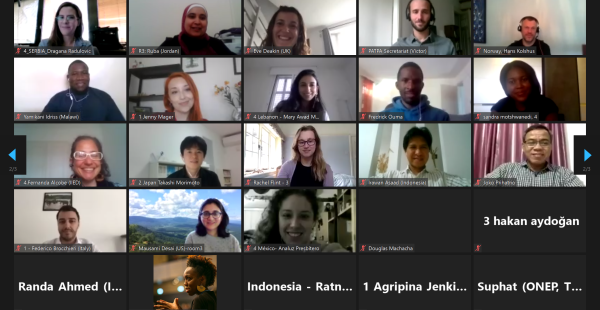
The 1st Virtual Edition of the Annual Partnership Retreat (APR)Takes Parties One Step Closer to a Successful Outcome of the Transparency Negotiations in Glasgow
The 1st Virtual Edition of the APR, which took place online on three consecutive days between September 28th and 30th, 2020 got over with 67 participants from 41 countries and 10 international organisations together, for three hours each day.
The virtual APR was set up as a space where transparency negotiators and practitioners could meet to bridge the large gap between COP-25 and COP-26.
Participants were invited to focus their discussions on two main topics: the ongoing negotiations on the Common Tabular Formats (and other transparency matters) and the transition from the current MRV requirements to the Enhanced Transparency Framework.
Throughout the three days, the discussions were preceded by presentations from the UNFCCC, the current and upcoming COP presidencies Chile and the UK, and the CCXG (Climate Change Expert Group). The breakout sessions allowed participants to embark in deep and lively discussions which allowed for a greater understanding of parties’ negotiation positions and of barriers and challenges in the transition to the ETF, namely on the use of common tabular formats.
Generally, participants are confident that it will be possible to find compromises on the key negotiations issues, even though it is recognized that due to the technical complexity and political implications, a lot of effort will still be required of all parties at and in the run up to COP-26.
It is commonly accepted that the best effort to transition to the ETF is to continuously improve the implementation of the current MRV requirements. In this context, it was very encouraging to see a wave of countries actively working on their 1st, 2nd, 3rd or even 4th BUR. Nonetheless, it was also recognized that the lack of capacities in many countries, in particular LDCs and SIDS is preventing them to prepare and submit National Communications and Biennial Update Reports and that for these countries, in particular, the timely and sustainable provision of support is fundamental.
Making full use of the tools of the online meeting platforms, the APR agenda included several types of sessions that kept participants engaged and actively contributing to the discussions, which took place both in plenary and break out Rooms.
The APR received very good feedback from participants, albeit the balance between high level discussions and specific discussions are yet difficult to achieve in a virtual space. PATPA takes it as an encouragement to continue to provide a space for negotiators and practitioners to meet, perhaps virtually and hopefully in-person in Bali in 2021.
“..it managed to be the best meeting of the year, yet again. The effort to engage us is very apparent, and also very successful.”
“The forum was useful and helpful. Foremost, as a way to keep in touch with, and connect with other negotiators across groupings, to build trust - this is an important part. The substantive discussions here, to be honest, kept to relatively known elements. I think this would naturally improve over time as participants get used to the virtual format. […] The balance between high level enough to avoid alarming participants and specific enough to progress negotiations will be difficult to achieve - but encourage you to continue what was a very good and well organised and hosted start!”
Contact
Secretariat| Annual Partnership Retreat (APR) | Partnership on Transparency in the Paris Agreement (PATPA)
Carlos Essus & Mijako Nierenkoether
Email: info@transparency.net


